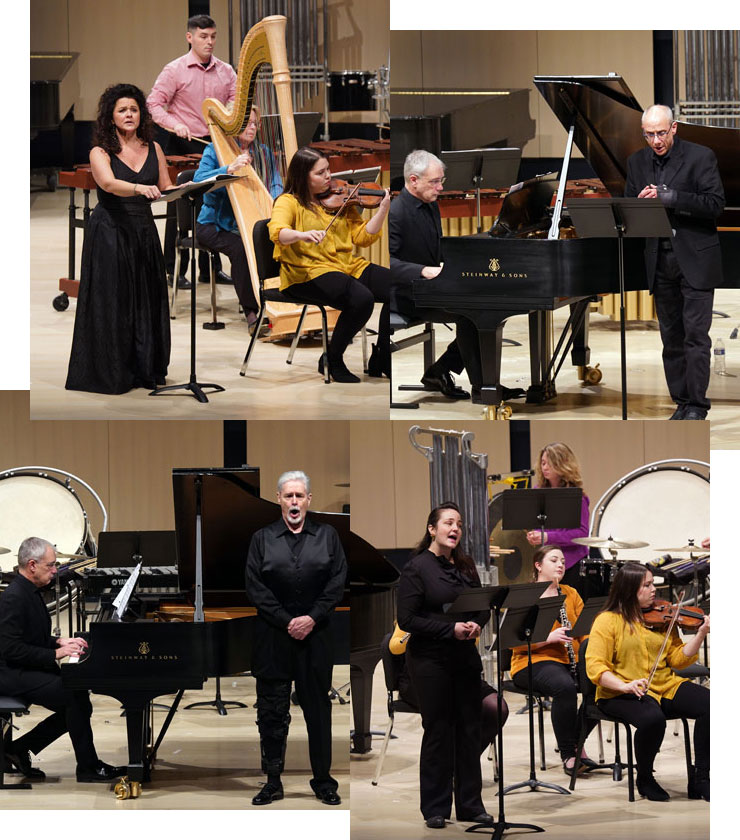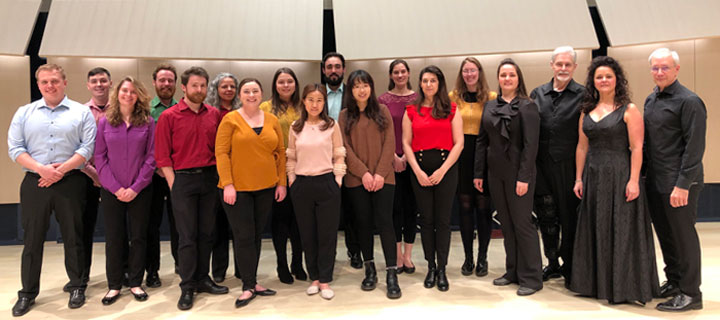
The Center for New Music
David Gompper, director
A concert featuring Words and Music
A concert highlighting the voice area of the School of Music performing musical settings from the past 70 years. From texts by Shakespeare, Quasimodo, Mirabai, and Stevens by American and British composers shows the diversity and the enduring strength of song as a staple of serious art music.
Sunday, February 16, 2020 at 7:30p in the Concert Hall
View: Concert Solo Photos
View: Post Concert Group Photo
Program
La Terra Impareggiabileo (2011) Richard CAUSTON
I. La terra Impareggiabile
II. E la tua veste è bianca
III. Ho una bella fanciulla
IV. Fatta buio ed altezza
V. Rifugio d’uccelli notturni
David Gompper, piano
MiraBai Songs (1982) John HARBISON
II. All I Was Doing Was Breathing
III. Why Mira Can’t Go Back to Her Old House
IV. Where Did You Go?
V. The Clouds
VI. Don’t Go, Don’t Go
Alexis Letourneau, alto flute
Ana Maria Locke, bass clarinet
Pam Weest-Carrasco, harp
Nick Miller, percussion
Luciana Hontila, violin
Donghee Han, viola
Sarah Hansen, violoncello
Will Yager, double bass
David Gompper, conductor
Let Us Garlands Bring, op. 18 (1942) Gerald FINZI
II. Who is Silvia?
III. Fear no more the heat o’ the sun
IV. O Mistress Mine
V. It was a lover and his lass
David Gompper, piano
The Ultimate Poem is Abstract (2016, rev 2017) Kate SOPER
Text by Wallace Stevens and others
Alexis Letourneau, flute
Jenna Sehmann, oboe
Ana Maria Locke, clarinet
Sean Miller, tenor saxophone
Irene Tang, horn
Brian Powell, trumpet
Tom Kelley, trombone
Peter Naughton, percussion
Sabrina Gafrick, percussion
Nick Miller, percussion
Karina Glasinovic, piano
Luciana Hontila, violin I
Joshua Palazzolo, violin II
Donghee Han, viola
Sarah Hansen, violoncello
Will Yager, double bass
David Gompper, conductor
Performers
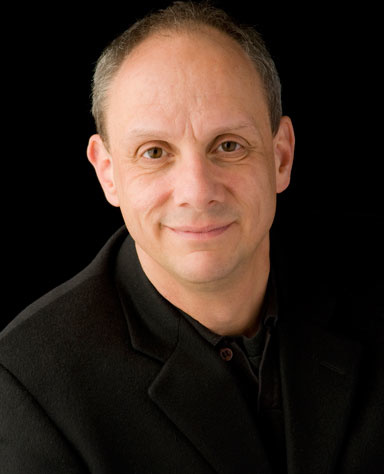
John Muriello, baritone
John Muriello has carried on a varied performing career in opera, operetta, musical theatre and concert work.
Stage credits include Tartuffe in Kirk Mechem’s Tartuffe, the Lecturer in Argento’s A Water Bird Talk, Ko-Ko in The Mikado, Marcello in La Bohème, Voltaire in Candide, Guglielmo in Così fan tutte, and Sir Toby Belch in Shakespeare’s Twelfth Night. Muriello has concertized in London at The Wigmore Hall and in Moscow at the Moscow Conservatory, as well as throughout the lower forty-eight.
Concert and oratorio solo credits include Mendelssohn’s Elijah, Vaughan William’s Five Mystical Songs, Orff’s Carmina Burana, and the Brahms Requiem. Muriello has performed with several contemporary music festivals, at the Union of Composers Autumn Festival in Moscow, the Banff Centre for the Arts in Canada, at the University of Michigan, the University of Iowa, and James Madison University. He has worked with the Skylight Opera Theatre, Opera Carolina, Lyric Opera Cleveland, L’Opera Français de New York, Ohio Light Opera, Seaside Music Theatre, Cedar Rapids Opera Theatre, and La Gran Scena Opera di New York (as Miss Sylvia Bills, America’s most beloved retired diva).
Muriello’s directing credits include H.M.S. Pinafore for Cedar Rapids Opera Theatre, and The Fantasticks, She Loves Me and A Little Night Music for the University of Iowa School of Music.
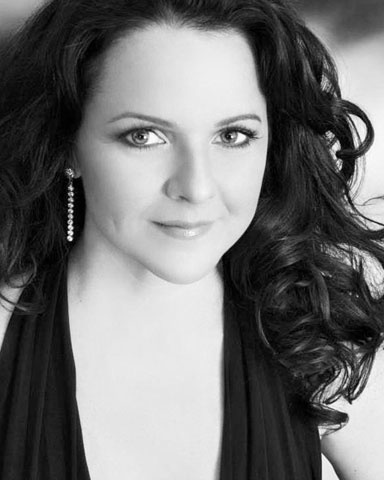
Elise DesChamps, mezzo-soprano
A native of Montréal, Canada, Mezzo-Soprano, Élise DesChamps, is praised for her dark, rich mezzo-soprano voice, and sensitive musicianship. Mrs. DesChamps is also a highly sought-after teacher and master clinician. From 2007-2019, she was a member of the voice faculty at Capital University in Columbus, Ohio, and from 2016-2019, she was a Graduate Teaching Assistant of The Ohio State University, where she won the Concerto Competition, and was granted The Margaret Speaks Vocal Scholarship and The Critical Difference for Women Scholarship.
Élise appeals to audiences and critics alike as a compelling and charming artist in opera, oratorio, and concert. She has been praised by Opera News for her “ability to handle coloratura effusions while bouncing with exhilaration about the stage,” her latest Carmen was described as “rich, powerful, sensuous; the audience who observed her actions and heard her dark, rich mezzo-soprano voice admired her vocal and dramatic skills,” and her debut with Opera Columbus was celebrated as “vocal brilliance and radiant beauty; the warmth of her voice and the fragrance of her beauty lend themselves to her sprite-like believability.”
Élise has appeared in leading mezzo-soprano roles in multiple seasons with companies including Opera Columbus, Cincinnati Opera, Asheville Lyric Opera, Columbus Symphony Orchestra, Springfield Symphony Orchestra, Opera Project Columbus, and Columbus Light Opera. She has performed with organizations including Virginia Symphony, the Boise Philharmonic, Bay View Music Festival, Southminster Concerts Ottawa, Distant Worlds: Final Fantasy, Piedmont Opera, Columbus State College, Ohio Christian College, Capital University Orchestra, Capital University Chamber Orchestra, St-Joseph’s Cathedral Schola, Bon Pasteur Historical Chapel, and Canadian Broadcast Corporation.
DesChamps earned her Doctor of Musical Arts from The Ohio State University, where she studied with Dr. Scott McCoy. She received her Master of Music degree from Indiana University Jacobs School of Music, where she studied with Virginia Zeani and Costanza Cuccaro. Élise is an alumnus of the Conservatoire de musique et d’arts dramatiques du Québec à Montréal, where she completed Bachelor degrees in cello and musicology. Élise DesChamps is an active member of the National Association of Teachers of Singing, the Honor Society of Phi Kappa Phi, and the Golden Key International Honour Society.

Steven Swanson, baritone
Steven Swanson is a concert and opera singer, a teacher of singing, and opera stage director. He earned degrees from North Park College and Northwestern University and served a two-year American Guild of Musical Artists apprenticeship with the Wolf Trap Company. After an internship at the International Opera Studio of the Zurich Opera, Swanson sang in opera houses in Switzerland, Germany, Austria, and the Netherlands for nineteen years. In 1994 he joined the voice faculty at The University of Iowa School of Music.
Throughout his career Swanson has performed with many renowned conductors, including concerts under Sir Georg Solti, Rafael Frübeck de Burgos, Margaret Hillis, and Vance George; and operas under Giuseppe Patanè, Nello Santi and Ferdinand Leitner. An extremely versatile performer, he sings works from the Baroque to the avant-garde as well as standard baritone concert repertoire, such as Brahms’ Ein deutsches Requiem, Mendelssohn’s Elijah, and his signature piece, Carl Orff’s Carmina Burana. In 2013 he added the 101st opera/operetta/musical role to his repertoire.
Since moving to Iowa Swanson has become an active recitalist. Expanding on the opportunity to collaborate with the many excellent musicians on the faculty of The University of Iowa, he has prepared and performed theme-based recitals since 1995. Two examples of these, Was my brother in the battle? Songs of War and Animal Songs: Bestiaries in English, French, and German have been released on CD by Albany Records.
For a complete repertoire list, photo archives, and live performance excerpts, see www.stephenswansonbaritone.com.
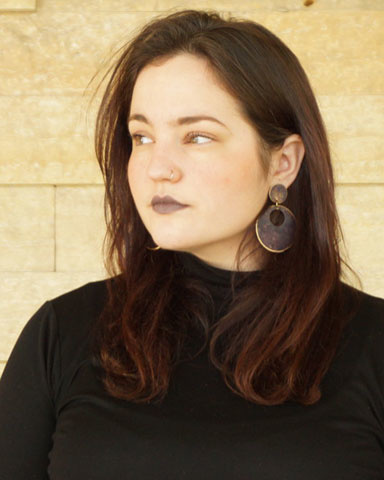
Anika O. Kildegaard, soprano
Soprano Anika Kildegaard is regularly sought out as a passionate interpreter and collaborator. She is a champion of new music, having premiered and commissioned new works from composers including, among others, Libby Larsen, Linda Kachelmeier, and Mitch Grussing. As a member and co-founder of LIGAMENT (soprano/double bass duo) she has been an ensemble fellow at summer festivals Cortona Sessions for New Music and New Music on the Point, premiered more than half a dozen new pieces and performed at concert series across the mid-west. She has sung with such notable groups as The VocalEssence Ensemble Singers, the Minnesota Chorale, the SPCO Chorale, MPLS (imPulse), and is a core member of the Grammy award winning ensemble The Crossing. Anika is a master’s student at the University of Iowa where she studies under Stephen Swanson.
Program Notes
La Terra Impareggiabileo
I encountered the work of the Sicilian poet and Nobel laureate Salvatore Quasimodo (1901-1968) in the mid 1990s while living in Milan. Having been at an impasse with my composition for almost a year, I began setting to music one of the poems (what turned out to be the last of ten songs), and the challenge of responding to its extreme concentration offered me a new way of working.
La Terra Impareggiabile evolved slowly between other projects and the final cycle – two books, each of five songs - was completed in 2018. All of them are closely interlinked musically and poetically, and taken together, they trace a trajectory through life to death.
In the first song the poet, poignantly aware his time running out, utters words of love that had previously eluded him. The perfect fifth in the piano (the notes D and G) and opening vocal line become a sort of refrain that appears every three numbers (at the start of songs I, IV, VII and X), at a slower speed each time. E la tua veste è bianca and Ho una bella fanciulla are a pair of contrasting love songs: one sensuous and sultry and the other (one of Quasimodo’s Sappho translations) a bouncy interlude in which the words become fragmented and assembled out of order, like text on strips of papyrus wrapped in different ways. The sharply contrasting sections of Fatta buio ed altezza evoke respectively intense light and intense darkness, while the refuge to birds of the night described in the next poem (Rifugio d’uccelli notturni) is a gnarled pine which stands on high, listening intently to the abyss.
La Terra Impareggiabile is dedicated to my teacher, Jeremy Dale Roberts.
| I. La terra impareggiabile Da tempo ti devo parole d’amore: o sono forse quelle che ogni giorno sfuggono rapide appena percosse e la memoria le teme, che muta i segni inevitabili in dialogo nemico a picco con l’anima. Forse il tonfo della mente non fa udire le mie parole d’amore o la paura dell’eco arbitraria che sfoca l’immagine più debole d’un suono affettuoso: o toccano l’invisibile ironia, la sua natura di scure o la mia vita già accerchiata, amore. O forse è il colore che le abbaglia se urtano con la luce del tempo che verrà a te quando il mio non potrà più chiamare amore oscuro amore già piangendo la bellezza, la rottura impetuosa con la terra impareggiabile, amore. |
I. The Incomparable Earth For some time I have owed you words of love: or perhaps those which daily disperse the moment they are struck and are feared by memory, which transforms the inevitable signs into enemy dialogue sheer onto the soul. Perhaps the roar of the mind drowns out my words of love or the fear of the arbitrary echo which blurs the weakest image of an affectionate sound: or they touch the invisible irony, its axe-like nature or my already encircled life, my love. Or perhaps it is the colour which dazzles them if they collide with the light of the time which will come to you when my own will no longer be able to call dark love, love already weeping the beauty, the impetuous rupture with the incomparable earth, my love. |
| II. E la tua veste è bianca Piegato hai il capo e mi guardi; e la tua veste è bianca, e un seno affiora dalla trina sciolta sull’omero sinistro. Mi supera la luce; trema, e tocca le tue braccia ignude. Ti rivedo. Parole avevi chiuse e rapide, che mettevano cuore nel peso d’una vita che sapeva di circo. Profonda la strada su cui scendeva il vento certe notti di marzo, e ci svegliava ignoti come la prima volta. |
II. And Your Dress is White Your head is tilted and you watch me; and your dress is white and a breast emerges from the lace lying loosely on your left arm. The light overtakes me; trembles, and touches your bare arms. I see you again. Your words were closed and rapid, to give heart to the heaviness of a life which resembled a circus. Deep the road down which the wind blew certain nights in March, awakening us unknown like the first time. |
| III. Ho una bella fanciulla Ho una bella fanciulla simile nell’aspetto ai fiori d’oro, la mia Cleide diletta. Io non la darei né per tutta la Lidia né per l’amata… |
III. I Have a Beautiful Girl (Sappho fragment) I have a beautiful girl like the golden flowers, my dearest Cleïs. I would not give her away for the whole of Lydia nor for the beloved… |
| IV. Fatta buio ed altezza Tu vieni nella mia voce: e vedo il lume quieto scendere in ombra a raggi e farti nuvola d’astri intorno al capo. E me sospeso a stupirmi degli angeli, dei morti, dell’aria accesa in arco. Non mia; ma entro lo spazio riemersa, in me tremi fatta buio ed altezza. |
IV. Become Darkness and Height You come in my voice: and I see the calm light descend in a shadow of rays and form a cloud of stars around your head. And I, transfixed, amazed at the angels, at the dead, at the incandescent arc of air. Not mine; but re-emerged within the space, in me you shudder become darkness and height. |
| V. Rifugio d’uccelli notturni In alto c’è un pino distorto; sta intento ed ascolta l’abisso col fusto piegato a balestra. Rifugio d’uccelli notturni, nell’ora più alta risuona d’un battere d’ali veloce. Ha pure un suo nido il mio cuore sospeso nel buio, una voce; sta pure in ascolto, la notte. |
V. Refuge to Birds of the Night On high there is a gnarled pine; it stands intent, listens to the abyss with its trunk bent like a bow. Refuge to birds of the night, in the highest hour it resounds with a rapid beating of wings. My heart too has a nest suspended in the dark, a voice; the night listens. |
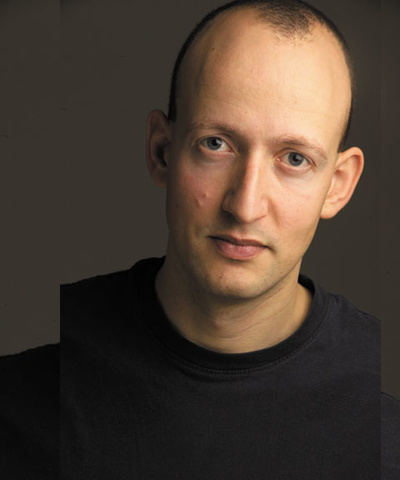
Causton has been commissioned by ensembles such as the BBC Symphony Orchestra, Philharmonia Orchestra, City of Birmingham Symphony Orchestra, Orchestra of the Age of Enlightenment, Sinfonieorchester Basel, Rundfunk-Sinfonieorchester Saarbrücken, London Sinfonietta, Birmingham Contemporary Music Group, Britten Sinfonia and the Nash Ensemble and his music has been recorded widely.
In 1997 Causton was awarded the Mendelssohn Scholarship, which enabled him to study in Milan with Franco Donatoni. Other distinctions include First Prize in the Third International ‘Nuove Sincronie’ Composition Competition, a British Composer Award and a Royal Philharmonic Society Award.
Richard Causton is currently Reader in Composition at the University of Cambridge (a tenured position equivalent to Full Professor in the US) and a Fellow in Music at King’s College, Cambridge. He recently became an Honorary Patron of the Centre for Young Musicians, an organisation which provides a musical education for children from disadvantaged backgrounds.
John Harbison
MiraBai Songs
Mirabai’s ecstatic religious poetry was written in sixteenth-century India. When she was twenty-seven, her husband was killed in a war. She left her family compound, wrote her poems to Krishna, the Dark One, and sang and danced them in the streets. Originally written for voice and piano, this version of Mirabai Songs was made for practical reasons: the new music ensemble thrives, the voice and piano duo is disappearing.
Texts by Mirabai, 16-century Indian mystic poet, Translated by Robert Bly
I. It's True I Went to the Market
My friend, I went to the market and bought the Dark One.
You claim by night, I claim by day.
Actually, I was beating a drum all the time I was burying him.
You say I gave too much, I say too little.
Actually, I put him on a scale before I bought him.
What I paid was my social body, my town body, my family body, and all my inherited jewels.
Mirabai says: The Dark One is my husband now.
Be with me when I lie down; you promised me this in an earlier life.
II. All I Was Doing Was Breathing
Something has reached out and taken in the beams of my eyes.
There is a longing, it is for his body, for every hair of that dark body.
All I was doing was being, and the Dancing Energy came by my house.
His face looks curiously like the moon, I saw it from the side, smiling.
My family says: "Don't ever see him again!" And imply things in a low voice.
But my eyes have their own life: they laugh at rules, and know whose they are.
I believe I can bear on my shoulders whatever you want to say of me.
Mira says: Without the energy that moves mountains, how am I to live?
III. Why Mira Can't Come Back to Her Old House
The colors of the Dark One have penetrated Mira's body; all the other colors washed out.
Making love with the Dark One and eating little, those are my pearls and my carnelians.
Meditation beads and the forehead streak, these are my scarves and my rings.
That's enough feminine wiles for me. My teacher taught me this.
Approve me or disapprove me: I praise the Mountain Energy night and day.
I take the path that ecstatic human beings have taken for centuries.
I don't steal money. I don't hit anyone. What will you charge me with?
I have felt the swaying of the elephant's shoulders; and now you want me to climb on a jackass? Try to be serious.
IV. Where Did You Go?
Where did you go, Holy One, after you left my body?
Your flame jumped to the wick, and then you disappeared and left the lamp alone.
You put the boat into the surf, and then walked inland, leaving the boat in an ocean of parting. Mira says: Tell me when you will come to meet me
V. The Clouds
When I saw the dark clouds, I wept, O Dark One, I wept at the dark clouds.
Black clouds soared up, and took some yellow along; rain did fall, some rain fell long.
There was water east of the house, west of the house; fields all green.
The one I love lives past those fields; rain has fallen on my body, on my hair,
as I wait in the open door for him.
The Energy that holds up mountains is the energy Mirabai bows down to.
He lives century after century, and the test I set for him he has passed.
VI. Don’t Go, Don’t Go.
Don’t go, don’t go. I touch your soles. I’m sold to you.
No one knows where to find the Bhakti path, show me where to go.
I would like my own body to turn into a heap of incense and sandalwood
and you set a torch to it.
When I’ve fallen down to gray ashes, smear me on your shoulders and chest.
Mira says: You who lift the mountains, I have some light, I want to mingle it with yours.
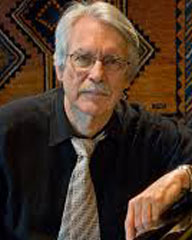
Harbison's concert music catalog is anchored by three operas, seven symphonies, twelve concerti, a ballet, six string quartets, numerous song cycles and chamber works, and a large body of sacred music that includes cantatas, motets, and the orchestral-choral works Four Psalms, Requiem and Abraham.
Recent works include Psalm 116 (Chanticleer), String Quartet No. 6 (Lark, Fromm Players at Tanglewood, and Telegraph Quartet), Presences (cello and string quintet), A Bag of Tales, (codas for piano), The Cross of Snow (in versions for viols with countertenor, and string quartet with mezzo-soprano), The Nine Rasas (clarinet, viola, and piano), and Painting the Floors Blue (for violinist Jennifer Koh). Harbison's opera The Great Gatsby, a commission from the Metropolitan Opera, was recently revived at Semperoper Dresden, after the European premiere there of a new production following performances in New York, Chicago, San Francisco, Aspen, Boston, and Tanglewood.
Harbison was President of the Copland Fund for fifteen years, and a trustee of the American Academy in Rome. He is a member of the American Academy of Arts and Letters and is a Trustee of the Bogliasco Foundation.
Gerald Finzi
Let Us Garlands Bring, op. 18
Finzi’s, Let us garlands bring, Op 18, comprises settings of five Shakespearean songs and bears the inscription ‘For Ralph Vaughan Williams on his birthday Oct. 12th 1942’. Performed first in the version for baritone and piano by Robert Irwin and Howard Ferguson on that day at a National Gallery lunchtime concert. Most of the songs were recent creations, composed between 1938 and 1942, but the emotional centre of the collection, Fear no more the heat o’ the sun, was written in 1929.
Feste’s second song in Twelfth Night, Come away, come away death, is a powerful lament where Finzi’s attention to salient words—the falling seventh to ‘death’, and the tantalizingly protracted melisma on ‘weep’ are but two fine examples—is exemplary, as is the freedom of the phraseology. There is also a lugubrious intensity in Finzi’s choice deployment of ‘jarring’ dissonance which is skillfully integrated with melodious, yet at times angular vocal lines. Who is Silvia?, from Two Gentlemen of Verona, is a charming ditty in ternary form. For the first three lines of each verse Finzi opts for transparent simplicity in his use of periodic (two-bar) phrases, but in the last two lines (which are effectively fused) this regularity is deftly subverted. Fear no more the heat o’ the sun, from Cymbeline, a meditation on the passing of time, on growing old and the dissipation of life’s fears in death, the great leveler, inspired Finzi to one of his most profound creations. The song, a sophisticated and controlled essay in sustained vocal writing, using the simplest of rhythmic and harmonic means, has a pathos (notably in the final, ethereal stanza) which rivals Dies natalis and the best of his Hardy songs. The remaining two songs of the collection, O Mistress Mine (Twelfth Night) and It was a lover and his lass (As you like it) provide lighter relief. The ‘troubadourish’ (to use Finzi’s own description) O Mistress Mine has a poise made all the more enchanting by the distinctive ‘thrummed’ guitar-like accompaniment and two-part quasi-Baroque dialogue of the upper strings (derived from the same texture in ‘The Rapture’ of Dies natalis). It was a lover and his lass is characterized by a syncopated accompaniment pattern (so much beloved of the composer) which lends the song an invigorating sense of well-being and happiness. Only briefly does a grey cloud appear in the third verse, when, for a moment only, there is a sense of regret (‘How that life was but a flower in springtime’). But this is soon dispelled by the jubilation of the last verse replete with ecstatic coda. –Jeremy Dibble
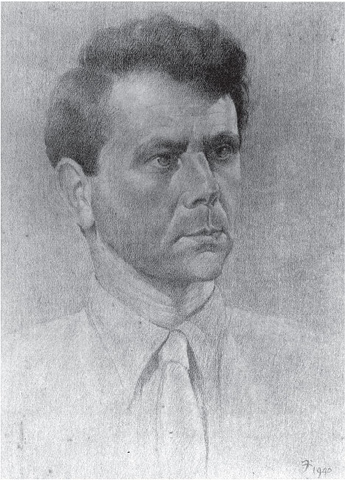
Kate Soper
The Ultimate Poem is Abstract
The Ultimate Poem Is Abstract began, as a lot of pieces do, with a vague musical notion – can I, a singer, be subsumed into an abstract musical texture? – and some even vaguer conceptual notions – what is an abstract musical texture anyway? Does it have an opposite? And if so, which is more “authentic”? Many texts were scrutinized in the effort to figure out what, exactly, I was trying to say, but ultimately only Wallace Stevens’ remained intact. The voice within this poem, like the voice of the soprano within the ensemble (and perhaps like the nattering voice inside the composer’s head), can describe, can question, can categorize – but ultimately longs most of all, with only occasional flickering success, to experience. –Kate Soper
| The Ultimate Poem is Abstract “…speech closes off thought…” |
-Susan Sontag, Silence |
|
| “…strain [your] ears to catch…the language of resemblance.” | -Michel Foucault, The Order of Things | |
| “Citation is the ultimate weapon…” | -Michel de Certeau, The Practice of Everyday Life | |
| “Est cogitatum ergo est.” | -Renato Poggioli, Avant-Garde | |
Proposition |
||
| “…everything in a narrative signifies…” | -Roland Barthes, Structural Analysis of Narratives | |
| Inexpressive unintelligibility expressive unintelligibility “[Her] eye was caught by the iridescent back of a beetle…the…progress of its… glittering body…a lesson that…in a [world] of] flux, the only thing of importance [is] to radiate beauty.” |
-Yukio Mishima, Spring Snow | |
| “The things one declines to say…” | -Michel Foucault, The History of Sexuality | |
| “Art [is] the enemy of the artist…” | -Susan Sontag, The Aesthetics of Silence | |
| “Why do you try to enlarge your mind? Subtlize it.” | -Herman Melville, Moby-Dick | |
Emphasis mine |
||
| “Confounded by the treachery of words the artist’s activity is cursed with mediacy.” | -Sontag, ibid. | |
| “To think clearly is a necessary first step towards political regeneration.” | -George Orwell, Politics and the English Language | |
| “[But] even before being expressed, sense is through and through temporal.” | -Jacques Derrida, The Voice that Keeps Silence | |
| “One has to believe in what one is doing, one has to commit oneself inwardly. [Otherwise] there is nothing left to do. For basically [this is] total idiocy.” |
-Gerhard Richter, interview | |
The day writhes with what? The lecturer On This Beautiful World Of Ours composers himself And hems the planet rose and haws it ripe, And red, and right. The Particular question — here The particular answer to the particular question Is not in point — the question is in point. If the day writhes, it is not with revelations. One goes on asking questions. That, then, is one Of the categories. So said, this placid space Is changed. It is not so blue as we thought. To be blue, There must be no questions. It is an intellect Of windings round and dodges to and fro, Writhing in wrong obliques and distances, Not an intellect in which we are gleet: present Everywhere in space at once, cloud-pole Of communication. It would be enough If we were ever, just once, at the middle, fixed In This Beautiful World Of Ours and not as now, Helplessly at the edge, enough to be Complete, because at the middle, if only in sense, And in that enormous sense, merely enjoy. |
-Wallace Stevens |
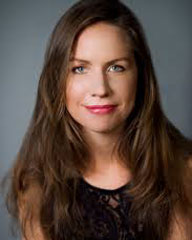
Soper is a co-director and performer for Wet Ink, a New York-based new music ensemble dedicated to seeking out adventurous music across aesthetic boundaries. She teaches composition and electronic music at Smith College.
